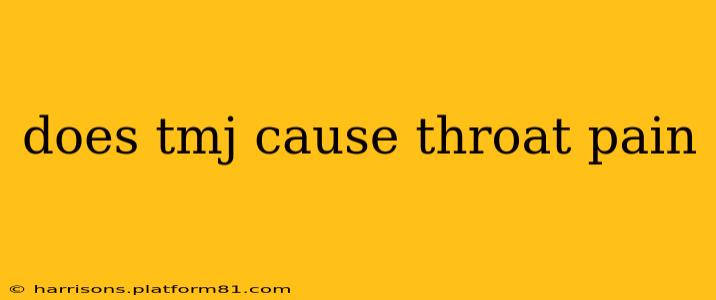Temporomandibular joint (TMJ) disorders, affecting the jaw joint and surrounding muscles, can indeed cause a surprising array of symptoms, and throat pain is among them. While not a direct, always-present symptom, the intricate connections between the jaw, neck, and throat muscles mean TMJ dysfunction can indirectly trigger throat discomfort. This article explores the potential link between TMJ and throat pain, addressing common questions and offering insights into diagnosis and management.
How Can TMJ Lead to Throat Pain?
The connection between TMJ and throat pain isn't always straightforward. It's not a case of the TMJ directly causing throat pain, but rather an indirect relationship stemming from the complex network of muscles and nerves in the head and neck. Here's how it works:
-
Muscle Tension and Referrals: TMJ disorders often involve significant muscle tension and spasms in the jaw muscles (masseter, temporalis, etc.). This tension can radiate, or refer, pain to nearby areas, including the throat. The muscles of the jaw are closely interconnected with the muscles of the neck and throat, creating a pathway for pain signals to travel.
-
Postural Changes: Chronic TMJ issues can lead to changes in posture, causing the head to be held forward or tilted. This altered posture can strain the neck and throat muscles, contributing to discomfort and pain.
-
Nerve Irritation: The trigeminal nerve, a major cranial nerve, innervates both the jaw and parts of the throat. Irritation or inflammation of this nerve due to TMJ dysfunction can cause pain in both areas.
-
Myofascial Pain Syndrome: This condition involves pain arising from trigger points in muscles, and it often coexists with TMJ disorders. Trigger points in the jaw muscles can refer pain to the throat and other areas.
What Other Symptoms Might Accompany TMJ-Related Throat Pain?
Recognizing other symptoms alongside throat pain can help in identifying a possible connection to TMJ. These might include:
- Jaw Pain: This is the most common symptom of TMJ disorders, often felt in the joint itself or the muscles surrounding it.
- Headaches: TMJ-related headaches can range from mild to severe and often affect the temples or sides of the head.
- Earaches: Pain in the ear, often described as a dull ache or pressure, is another common symptom.
- Neck Pain: Stiffness and pain in the neck often accompany TMJ issues due to the interconnected nature of the muscles.
- Clicking or Popping in the Jaw: This sound often occurs when opening or closing the mouth.
- Limited Jaw Movement: Difficulty opening or closing the mouth fully can be indicative of TMJ problems.
- Facial Pain: Pain in the face, particularly around the cheeks or temples, can also be a symptom.
Can a Doctor Diagnose TMJ-Related Throat Pain?
Diagnosing TMJ-related throat pain involves a thorough clinical examination by a doctor or dentist specializing in TMJ disorders. They will likely perform a physical exam focusing on the jaw joint, muscles, and range of motion. Imaging techniques like X-rays or MRI scans might be used to rule out other conditions. A detailed medical history, including a description of your symptoms and their duration, is also crucial.
How is TMJ-Related Throat Pain Treated?
Treatment for TMJ-related throat pain focuses on managing the underlying TMJ disorder. Options might include:
- Medications: Pain relievers, muscle relaxants, or anti-inflammatory medications can help alleviate symptoms.
- Physical Therapy: Exercises and stretches can help improve jaw mobility, reduce muscle tension, and improve posture.
- Splints or Mouthguards: These devices can help realign the jaw and reduce stress on the joint.
- Lifestyle Changes: Modifying diet (avoiding hard-to-chew foods), improving posture, and stress management techniques can all be beneficial.
Are there other causes of throat pain unrelated to TMJ?
Throat pain has many potential causes, and it's crucial to rule out other possibilities before attributing it solely to TMJ. These include:
- Infections: Sore throats, tonsillitis, and pharyngitis are common causes of throat pain.
- Acid reflux: Stomach acid flowing back into the esophagus can irritate the throat.
- Allergies: Allergic reactions can lead to throat irritation and inflammation.
- Postnasal drip: Excess mucus dripping from the nose down the back of the throat can be irritating.
- Cancer: While less common, throat pain can be a sign of throat or mouth cancer.
Disclaimer: This information is for educational purposes only and should not be considered medical advice. Always consult with a healthcare professional for diagnosis and treatment of any medical condition. They can perform a proper evaluation and determine the underlying cause of your throat pain.
